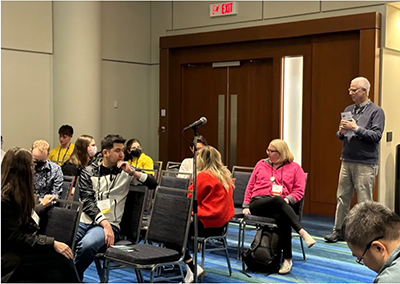AccessComputing Student Hosts Neurodivergent-Focused Birds of a Feather Session at SIGCSE in Toronto

Last year at the SIGCSE Technical Symposium, I selectively disclosed myself as autistic, receiving reactions ranging from ableist bewilderment (“Oh, really? You talk so eloquently for being autistic”) to quiet flickers of community as other attendees disclosed their own neurodivergence. As most disclosures happened in corners and hallways around the conference, I wanted a more explicit space for folks to find each other, unmask, and find community. So, this year, I organized a Birds-of-a-Feather (BoF), “Finding Neurodivergent Community in Computing Education.” BoFs, for those unfamiliar, are a 50-minute conference slot, intended to co-locate shared interests that otherwise would be diffused across a 2000 person conference.
Primarily, I wanted to build community, but I didn’t want this space to be any more uncomfortable than being at a normal conference where folks may have to explain themselves, or neurodivergence generally. Given the gorgeous breadth of neurodivergence, and that folks might need different spaces at different times, I offered a few group options: folks that wanted more excitable conference energy, folks that wanted to share conferencing-while-neurodivergent aches, and folks that just wanted to hang, among others. Drawing from caucusing techniques within teacher education, I opted to separate out everyone that considered themselves an ally from neurodivergent-identifying and neurodivergent-questioning folks. And, as oral speech shouldn’t be a requirement to connect with community, I made a discord server as well where folks could communicate over text instead of talking.
We had about around 25 attendees with lots of unmasking and peer support. One group talked through the decision to pursue a diagnosis; another discussed ways to heal the shame imposed by ableist expectations. I had a wealth of concerns around allies attending and making an explicit space (and asking a trusted ally to moderate discussion) assuaged many of my worries. However, creating this space required a decent amount of advocacy. BoFs require a two-page proposal at SIGCSE that’s peer reviewed; one reviewer argued that this space shouldn’t exist at the conference, another argued that there might need to be more neurodivergent scholarship before they could justify the existence of a community space. Both of these responses felt frustrating. While the space was not accessible to all neurodivergent members of the SIGCSE community (e.g. those who could not attend an in-person conference located outside the United States), I was immensely grateful for a conference space where I could show up with all of my delightful eccentrics proudly on display, with little concern for how I might be perceived, and deeply grateful to share that space with others.